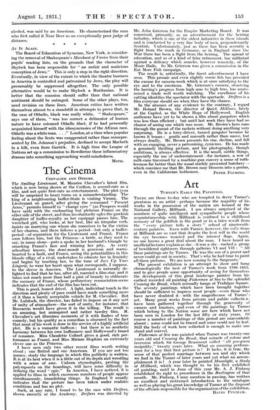The Cinema
CHEVALIER AND OTHERS.
The Smiling Lieutenant, M. Maurice Chevalier's latest film, which is now being shown at the Carlton, is second-rate as a film, and not quite first-rate as entertainment. The plot (you will be surprised to hear) turns on a misunderstanding. The king of a neighbouring buffer-State is visiting Vienna. The Lieutenant on guard, after giving the command " Present Arms," permits himself to " change eyes " (as Prospero would have said) with the enchanting but plebeian Franzi on the other side of the street, and thus involuntarily ogles the gawkish daughter of buffer-royalty as her equipage passes him. The wretched girl, who looks, at her best, like an irregular verb, insists on marrying one whom she conceives to be the victim of her charms, and there follows a period—but only a buffer- period—of separation for the Lieutenant and Franzi. Franzi soon follows him, but the Princess—a bride, as they used to say, in name alone—puts a spoke in her husband's triangle by smacking Franzi's face and winning her pity. As every schoolboy knows, the demi-monde is generous and warm- hearted to a fault, and Franzi, seeing the potentialities in this blonde effigy of a rival, undertakes to educate her in feminity and begins by teaching her, to the tune of Jazz Up Your Lingerie, to wear her heart upon what corresponds, I suppose, to the sleeve in America. The Lieutenant is naturally de- lighted to find that he has, after all, married a film-star, and it takes not much more than half a pint of brandy to obliterate the memory of Franzi, whose perfunctory renunciation-scene indicates that the end of the film has been cut.
This is good, honest drivel. A light, individual touch in the direction and plenty of pace could have made something more of it than a barely acceptable vehicle for M. Chevalier. But Mr. Lubitsch, the director, has failed to impose on it any sort of unity of atmosphere—the sort of unity, for instance, that Boccaccio would have given it in the telling. The result is an amusing, but uninspired and rather tawdry film. M. Chevalier's art illumines moments of it with flashes of true comedy, but his quality as a comedian is obscured by the fact that most of his work is done in the service of a highly artificial plot. He is a romantic buffoon ; but there is no aesthetic harmony between his own buffoonery and Hollywood's brand of romance. Miss Claudette Colbert gives a good, rich per- formance as Franzi, and Miss Miriam Hopkins an extremely clever one as the Princess.
I have seen only two other recent films worth writing about ; one British and one American. If you are not too queasy, study the language in which film publicity is written. It is at its best when it is a little out of its depth and wrestling with a sense of awe. Unborn etymologists, probing the palympsests on the hoardings, will have some difficulty in defining the word epic." In America, I have noticed, it is applied to films in which enormous numbers of people appear simultaneously, brandishing things. In England it usually indicates that the picture has been taken under realistic conditions and has no plot.
Such, at any rate, I found to be the case with Drifters, shown recently at the Academy. Drifters was directed by Mr. John Grierson for the Empire Marketing Board. It was conceived, primarily, as an advertisement for the herring industry, which is one of the oldest industries in these islands and is conducted by a very fine body of men, preponderantly Scottish. Unfortunately, just as there has been recently a flight from the mark in Germany, so in England since the War there has been a flight from the herring. The spread of education, and so of a kind of false refinement, has militated against a delicacy which smacks, however remotely, of the Music Halls. So Mr. Grierson was given a commission in the Eat More Fish campaign. The result is, artistically, the finest advertisement I have seen. This prosaic and even slightly comic fish has provided the excuse for camera-work which is at once satisfying to the eye and to the emotions. Mr. Grierson's camera, observing the herring's progress from high seas to high teas, has anato- mized a trade well worth watching. The excellence of his cutting identifies the spectator with the spectacle. Drifters is a film everyone should see when they have the chance.
In the absence of any evidence to the contrary, I regard Mr. Roland Brown, the director of Quick Millions, lately at the Capitol, as the White Hope of Hollywood. English audiences have yet to be shown a film about gangsters which was less than efficient • but until last week they have had no chance of seeing one which was more. Mr. Brown's hero rims through the gamut of the rackets without doing anything very surprising. He is a lorry-driver, turned gangster because he knows it teases : gentle and uncouth rather than suave, but always deadly. Mr. Brown presents his rise, decline, and fall with an engaging, never a patronizing, cynicism. He has made a genuinely thrilling picture, and his photography, though ambitious, is always effective. It is the small, things, especially the use of understatement—for instance, a row of milk-cans traversed by a machine-gun convey a sense of ruth- lessness far better than the usual starkly presented butchery— which convince me that Mr. Brown may blossom into a genius,
even in the Californian hothouses. PETER FLEMING.


































 Previous page
Previous page